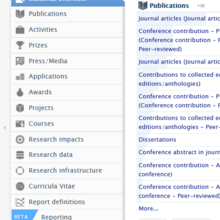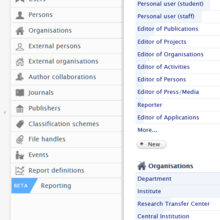CRIS data types (e.g. Researchers, Research units, Publications, Projects)
CRIS data types in database and research portal
In the CRIS database, a distinction is made between the classic data types under the “Editor” tab, these among others include:
- Publications,
- Projects,
- Prizes,
- Activities,
- Research data,
- Press/Media,
- Research infrastructure,
- Research impacts;
and the data types under the tab “Master data”, among which the following are particularly relevant:
- Users,
- Persons,
- Organisations.
The administrators create a user account for all DSHS users of the CRIS (scientists, editors, etc.). This account gives you access to the CRIS database. There you can make and manage data entries of the different classic data types according to your role.
As DSHS researchers (usually research employees/fellows and PhD students), you also have a personal data entry, some of whose data is automatically synchronized and some of which can be edited by you. Finally, as CRIS editors (e.g. secretariats of Research units) you may have the authorization to manage organisation data entries (e.g. of institutes, departments or transfer centers).
In contrast to the CRIS database, the CRIS portal does not distinguish between master data types and classic data types. The data types “Researchers” (= Persons) and “Research units” (= Organisations) are listed there on an equal footing with the classic data types.
Screenshots for illustration:
Clicking on each data type (below) will take you to the corresponding explanations of the settings you can make in the CRIS database in order to ensure the optimal presentation of your research achievements in the public CRIS portal.



